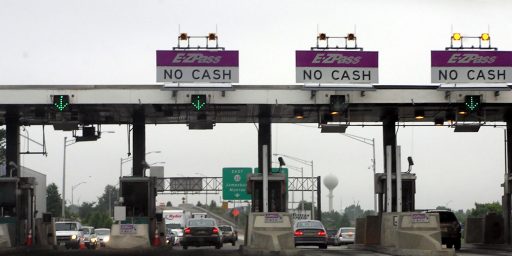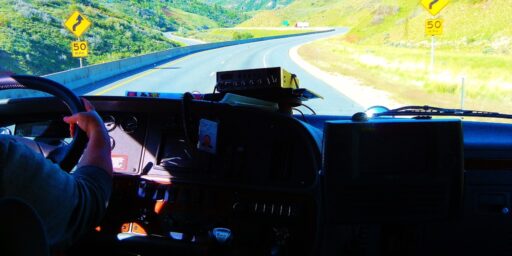Former Governor Proposes Tolls On Capital Beltway
Gerald Baliles, who served as Virginia’s governor from 1986-1990, has proposed making the I-495 Beltway and other major routes in the area toll roads.
Former Governor Proposes Tolls On Beltway (AP)
Former Virginia Gov. Gerald Baliles has proposed making the Capital Beltway as well as other Virginia interstates into toll roads. While in office, Baliles was known as Virginia’s “transportation governor.” He submitted a toll plan to Sen. John Chichester calling for 85-cent tolls at 38 points in Virginia on interstate highways. Baililes said the tolls would raise $1 billion a year for road projects in Virginia, like widening the Beltway and other commuter routes in the state’s north.
The Washington Post reports that Virginia Transportation Secretary Pierce Homer thinks the plan is “a thoughtful proposal.”
But Baililes also acknowledges that the plan will face stiff challenges because truckers, delivery services and commuters would see their daily costs rising by dollars a day if it’s implemented.
Gee, ya think?
Apparently, WaPo doesn’t take this plan too seriously, having relegated their coverage to page B03.
Baliles Proposes $1 Billion Toll Plan
Former governor Gerald L. Baliles (D) has proposed a plan to charge tolls on the Capital Beltway, on Interstates 66, 95 and 395 and at dozens of other spots across Virginia as a way to raise $1 billion a year to solve the state’s mounting transportation problems.
In all, the plan calls for charging a toll of 85 cents at 38 spots on interstate highways that Baliles said would fund several much-needed projects, including widening the Beltway and other major commuter routes in Northern Virginia.
[…]
Baliles laid out his vision in extensive detail, listing the spots where he envisioned tolls and the amount of revenue each site would take in. In Northern Virginia, he proposed tolling drivers on the Beltway at the Woodrow Wilson Bridge, Route 50 and the American Legion Bridge. On I-66, drivers would be tolled at Vienna and at Prince William County’s borders with Fairfax and Fauquier counties. Drivers on I-395 would be charged at the D.C. line, and I-95 motorists would be charged at Backlick Road.
Essentially, a toll–and the resultant delays and infrastructure costs–at all the major chokepoints in the region. Usually, a toll road is a convenient way to bypass a more congested “free” route. Baliles’ plan would essentially force people to pay tolls to take even ordinary roads. Indeed, it would virtually wall of the nation’s capital to people approaching from Virginia.
“Thoughtful,” my eye.
crossposted to OTB-BS





This is one of the worst ideas to come down the pike. It will never happen.
While we’re at it, why not convert the two left lanes on the beltway into HOV-3’s?
It’s 4 lanes in each direction, the regular traffic will flow easily on the existing 2 lanes left!
Like it does now!
/sarcasm
thhhppt! idiots
I find it amazing how many supposedly free-marketeers hate tolls. Even on existing roads, tolls are a better way to allocate scarce resources than are lines (rationing) – didn’t the Soviet Union teach us that a while ago?
Hell, this brings us UP to the point where the Metro riders already are – paying a ‘fare’ every day to use the road. And don’t talk about the gas tax; it’s not directed towards any road in particular, doesn’t pay anywhere near the full bills, subsidizes suburbanites, etc. Get enough of these tolls and I’d gladly reduce your gas tax though.
Even Adam Smith thought roads and basic infrastructure should be public goods. Paying a tax every time one uses a road is impractical and inefficient.
Actually shifted from lost time to money. You still pay, you are simply paying in terms of time spent stuck in traffic. If you spend an hour on your commute and get paid $30/hour you should concievably be willing to spend $30 to get to work an hour earlier to earn money for that hour (hence you break even).
Actually, it doesn’t have to be that bad in that new technology allows for regular commuters to use stickers/cards and scanning technology so as you whiz by under the machine-vision-reader at 65mph it reads your card and charges your account accordingly.
Even Adam Smith can be wrong. Roads are public goods subject to congesetion this means using tolls to control the congestion is one way to regulate the use of the roads.
Steve, I drove the Dulles Toll Road with a SmarTag for a year and even those dedicated lanes got congested at the toll booths when people slowed down to get through the booth. You cannot fly through those booths at 65mph safely and so the resulting slow downs required by the posted speed limits in those areas will mean increased back ups.
It’s a terrible idea.
‘so as you whiz by under the machine-vision-reader at 65mph it reads your card and charges your account accordingly.’
Wha…? In the NE many states have EZ-Pass and you still have to go thru the toll booth and the speed is 15mph. Now there are problems where the EZ-Pass lanes are too congested and it’s quicker to pay cash.
EZ pass is upgrading their scanners and some of the booths now tell drivers not to slow down. In the Southern California HOT lanes, the scanners read the transponders as the cars pass below at 70+ mph.
The southern end of the NJ Turnpike has been converted to a high-speed EZ-pass set-up also. I am all for tolls as long as the roads are kept nice and the collection of the toll doesn’t slow me down.
Adam Smith wasn’t wrong, insomuch as he was just not familiar with technology 230 years after he wrote TWON. Large roads don’t have to be monopolies anymore because of transponder technology. If it were up to me, most of the nation would have toll roads, except in neighborhoods.
As for the chokepoints, that’s the best part of the idea. The idea behind tolls isn’t just to be able to opt off a “free” road to save time. It’s to make people think about exactly how much driving they want to do and when to do it.
If you’re concerned with double-taxation, or what not, then insist that any toll roads on existing roads be done in a revenue neutral fashion.
Robert: But most of the core driving done of these roads is commuting to and from work. In major metro areas, certainly D.C., people are being forced to move further and further out in order to afford housing. One has to get more than 60 minutes away from D.C. to find even a townhouse under $250,000. And public transportation isn’t an option that far out. Driving is simply a necessity of life.
The idea behind tolls isn’t just to be able to opt off a “free†road to save time. It’s to make people think about exactly how much driving they want to do and when to do it.
Right. */sarcasm*
As James said above, DC drivers are constantly trying to figure out the best driving path to save time already – we don’t need additional tolls for that. And the only way we can factor in how much driving we “want” to do is based on where our jobs happen to be and where we can afford to live.
Additional toll roads in this area will only make a barely tolerable commuting situation worse.
Fersboo is right about the Jersey Turnpike – the southern outlet is awfully nice now if you have an EZPass.
But unless a) such high speed technology could be established around here (Virginia suburbs) and b) all cars be required to use it (an absolute impossibility), then the effect of these choke points on an already over-stressed commuter flow would be devastating.
I agree with James and Jen that there aren’t a whole lot of people on the Beltway, I-395 and I-66 because they actually want to be.
I still think it could be made to work. Car-pooling could cut tolls by as much as 3/4. There would be some coordination and some inconvenience — everybody leave at the same time, come home at the same time — but there’s no doubt that the people who readily dismiss such an idea now would find a way to make it work if the tolls ever actually went into place.
There’s also telecommuting. Employees who can do that would be in a position to insist on it from employers due to the toll costs. All of this would have the effect of reducing traffic and congestion.
Driving to a train station and taking the train the rest of the way is another option.
Building more roads without tolls, or widening existing ones, is a losing battle as they will fill up as soon as they open.
Jen,
You’re right that it won’t happen, but that only tells me that the situation will just continue to get worse. No doubt about it.
The same people dismissing the existing plan will be complaining furiously in a few years when traffic has increased by 50%, but out of consistency they will still be opposed to tolls. They won’t have a plan, but they’ll be consistent.
There’s no other workable alternative.
When London imposed the user fee to drive into Central London, traffic improved dramatically overnight.